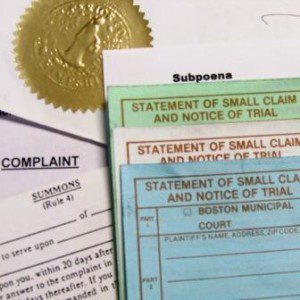
Court papers, sometimes served by a sheriff or process server, other times arriving by mail, should never be ignored.
Failing to respond will result in a default judgment.
Always answer a summons within the time limit. When you are served with a law suit, the papers will tell you the deadline for a response.
If you do not respond the party that filed the suit can apply for a default judgment against you and then pile on attorney fees and costs.
Answering Court Papers
If you have any doubt how to answer the legal papers, here are some options:
- Read the summons and all other papers you have received. Most summonses and other service papers explain what steps to take and the deadline.
- Retain an attorney. This is the best option because attorneys understand the language in the complaint, what it means and most important what valid defenses are available to you. This may give you a good faith fighting chance. People sometimes claim “I can’t afford an attorney.” But, spending some money up front can save bigger trouble later.
- Go to the court clerk’s office and ask for help. Court clerks by law are prohibited from giving actual legal advice. Don’t ask clerks to tell you what to say in response to the papers or how to defend yourself. But they may be able to assist in providing various forms or explaining the time deadlines.
- If you absolutely can’t afford an attorney, call a state or county bar association or legal assistance service. Ask for a low fee/no fee referral. Be ready to verify your financial situation.
- When a complaint comes with numbered paragraphs, each numbered paragraph must be admitted or denied. The other option, only if in good faith, allows a statement that there is insufficient information to either admit or deny. This has the same effect as a denial. Small claims complaints and some other legal papers do not require a paragraph by paragraph answer, but again the papers more often than not explain how to respond if you contest the complaint.
Discovery in Civil Law Suits
Beyond answering the legal papers, civil court rules also allow parties in a law suit to send discovery, requiring the opposition to answer questions and to provide documents. Here’s a good article on the key role of discovery in civil cases: click here. Discovery can only be done if you answer in a timely fashion, and is best done by an attorney.
Other Options: Bankruptcy?
If you have overwhelming debt and the papers you’ve received are just one nagging symptom, then at least consider bankruptcy as an option. Click here for bankruptcy basics.
My office represents consumer debtors in Chapter 7 and Chapter 13 bankruptcies in New Hampshire and Massachusetts. In other jurisdictions I highly recommend consulting with an experienced consumer bankruptcy attorney in your jurisdiction. The National Association of Consumer Bankruptcy Attorneys, NACBA, has an attorney finder tool to help: NACBA
Views: 7




